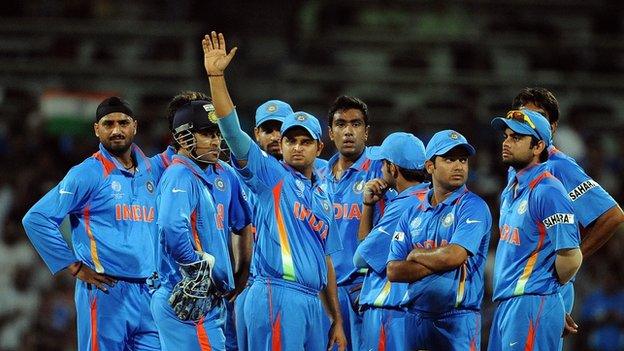ICC asked to reconsider DRS position
- Published

Indian cricket team await the decision of an umpire review
Current and former international cricket players, administrators and commentators alike have joined together to urge cricket's governing body (ICC) to reconsider its decision not to make Decision Review System (DRS) compulsory for all countries.
The ICC Board last month deferred adopting a recommendation by its own executive committee to implement the DRS universally after India, the cricket's biggest market thanks to the huge fan base, objected to the recommendation.
Federation of International Cricket Players Associations (Fica), which does not represent Indian players, says the decision is a "sad reflection of the governance of the ICC".
"Can you imagine if just a minnow like BCB opposed it - it would have no chance of stopping its universal application," Fica Chief Executive Tim May told BBC Sinhala service.
Tim May and former MCC president Mike Brearley both are fully supportive of the universal implementation of the DRS, which uses ball-tracking and thermal-imaging technology to check the accuracy of the umpire's decisions whether a batsman was out.
Saying that he "regrets" the response of the Indian board, BCCI, the head of MCC cricket committee Brearley adds: "One part is: if one is going to wait for 100% one will wait until Kingdom come. The primary aim of DRS is to put right things that are pretty certainly wrong."
During the current series played in Sri Lanka, both Sri Lanka captain Mahela Jayawardene and his Pakistan counterpart Misbah ul Haq have called upon the ICC to make DRS compulsory for all matches.
Sri Lanka former national captain, Arjuna Ranatunga, MP, agrees that full implementation of DRS is required.
"I think DRS is the best thing happened to game of cricket for the past few decades," he told BCC Sinhala service, Sandeshaya.
He added: "But the real question is whether the ICC have a backbone to stand against Indian dominance. What actually happened during the past few years was that the game of cricket was destroyed by dancing into India's tune for the sake of money."
Fica's Tim May is also highly critical of the way the ICC conducts its affairs.
"The committees are full of nepotism, conflicts of interests and members who feel threatened or intimidated by stronger countries. The Board urgently requires independent skilled directors," he said.
It is not, however, only non-Indians who are critical of both the ICC and the Indian board.
Cricinfo Indian edition's senior editor Sharda Ugra says that other Test playing nations will not be able to spare the blame as none of them called for a vote at the board meeting with regard to implementing the new technology.
"No matter how much you say all other countries are supportive of the DRS, if you are against it you have to take it to the board room and take it to the vote and say 'you are out-voted'," she said.
She also describes the behaviour of the BCCI as bullying.
"We need someone to stand up and say - I don't care, if the Indians are unhappy with me - and stand up to the BBCI and take the issue forward. Anyone knows that the answer to bullying is to stand up to the bully," Sharda Ugra told BBC Sinhala service.
And Fica's Tim May agrees.
"The BCCI are a very powerful nation by virtue of their commercial strength - no one begrudges them that - what concerns numerous stakeholders in the game, is how they use that power," he said.
Former MCC president Mike Brearley has other thoughts.
"I don't have any idea whether this is bullying by India. It sounds more like stubbornness to me." he told BBC Sinhala.
"I am inclined to agree with Wally Edwards and Dave Richardson, that we have to hope that India will see the evidence and be reconciled to DRS. It seems to me as I say that it is wrong to insist on 100% accuracy," Mike Brearley added.
Objection by the BCCI and the senior players comes after many DRS decisions went against India at 2008 Test series against Sri Lanka in Sri Lanka.
Since then, they have been arguing that more research needs to be carried out about the accuracy of the new technologies.
"Rather than focusing on their individual records, the Indian players should think about the game and the benefit of the DRS for the game in general," says Arjuna Ranatunga, who also served a year as the head of Sri Lanka cricket board.
"Certain umpires are afraid of giving decisions against certain Indian batsmen. Some international umpires were intimidated by the cricketing giants, not only Indian but in general. The situation has been changing since the DRS system was introduced and umpires are able to give correct decisions," said Ranatunga, currently an opposition MP.
Cricinfo India editor Sharda Ugra and MCC's Mike Brearley suggest that cricket's governing body should bear the financial burden of implementation of the review system, instead of the host nation. Ms Ugra also suggests that it is time for the other Test nations to stop relying on Indian market.
"Build yourself financially independent from having Indian television companies away from you," she said.
There was no immediate response from the BCCI.
The newly appointed ICC Chief Executive David Richardson refused to comment until after a review on ball-tracking technology is completed.